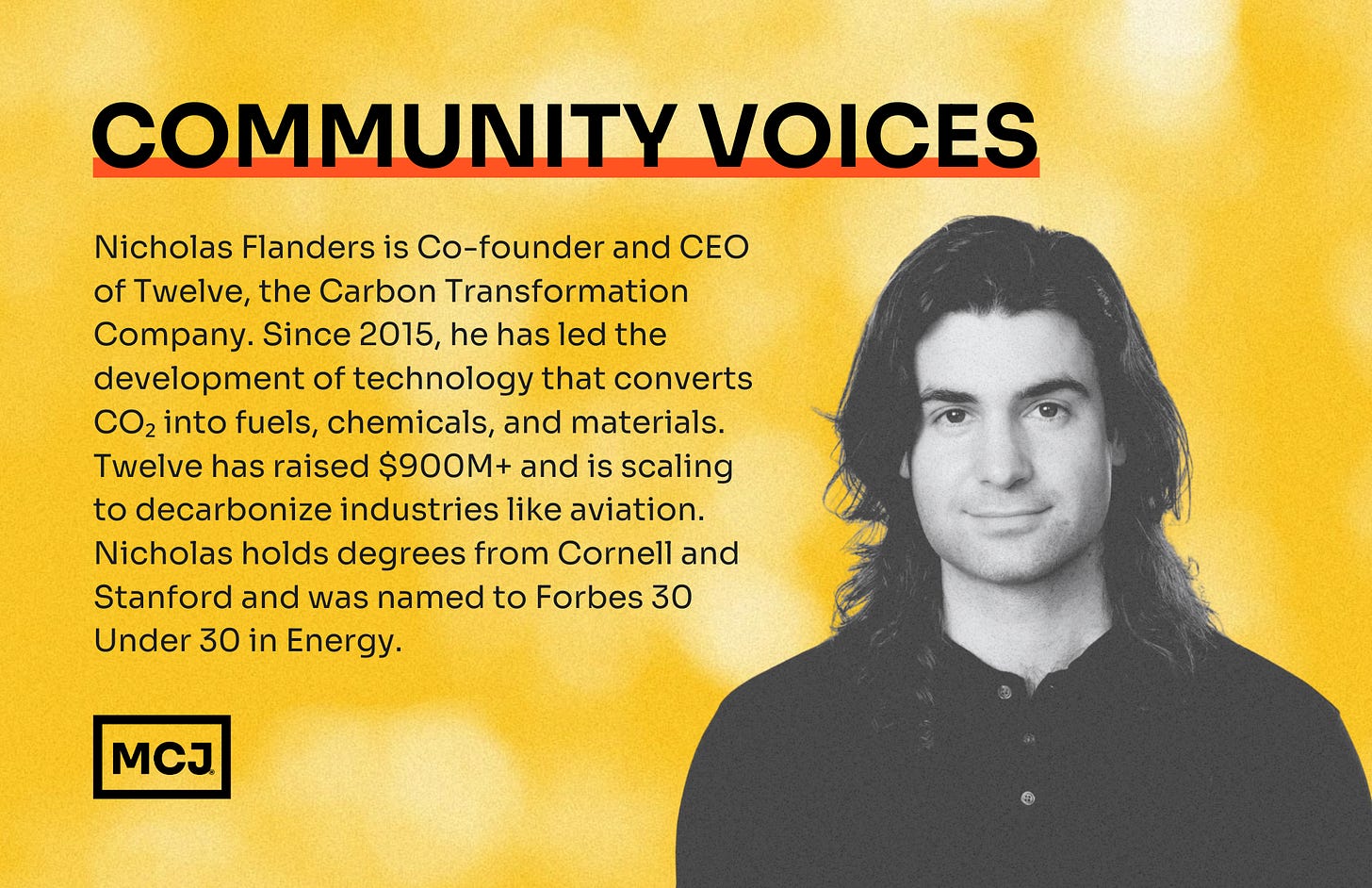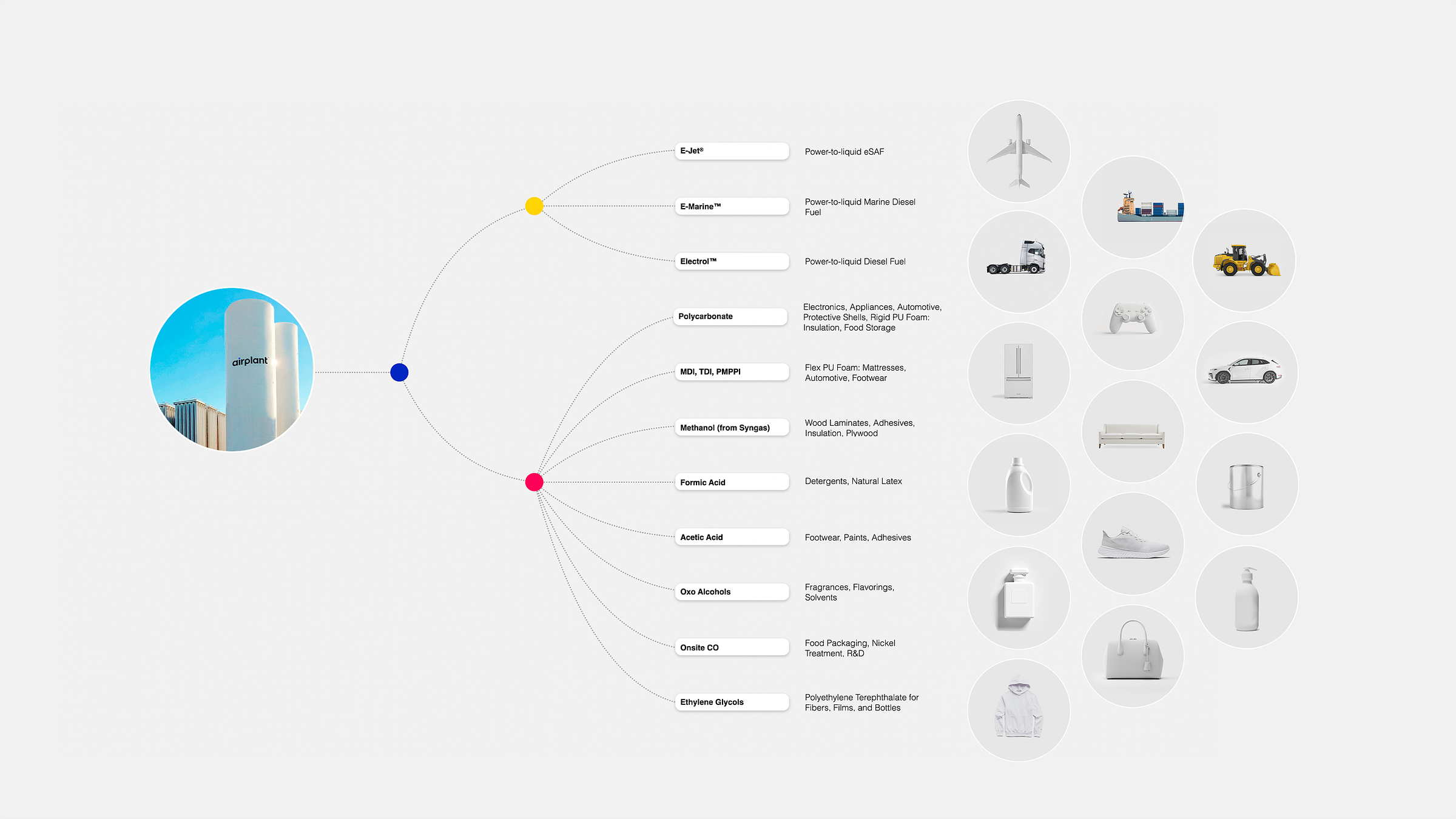The Business Case for Carbon Transformation
by Nicholas Flanders, Co-founder and CEO of Twelve
Supply chains have grown dangerously fragile. Over 95% of feedstocks for chemicals, materials, and fuels depend on petroleum—a finite, volatile resource that embeds geopolitical risk into every aspect of production. Meanwhile, corporations face mounting pressure to reduce Scope 3 emissions, which account for 75% or more of total carbon footprints. This dual crisis demands a fundamental transformation.
Enter carbon transformation: the process of converting CO2 emissions into critical products traditionally derived from petroleum. Like digital transformation from two decades ago, this shift represents a complete reimagining of how businesses source, manufacture and compete.
In 2022 alone, the chemicals market amassed over $5 trillion in revenue and is only projected to grow by 2030; the CO2-based plastics market alone is expected to grow at a compound annual rate of 10% from 2025 to 2030, reaching $5.45 billion by 2030. Carbon transformation represents a pivotal shift in manufacturing and supply chain strategy. For C-suite leaders seeking to future-proof their businesses, adopting carbon transformation as a core strategy isn't just about meeting sustainability commitments; it’s a business imperative that builds resilience, competitiveness, and long-term profitability.
What Exactly Is Carbon Transformation?
It’s not storage, it’s transformation into identical drop-in replacements for petroleum-based chemicals.
Traditional Carbon Capture, Utilization, and Storage (CCUS) typically captures CO2 and either stores it underground or uses it in processes like enhanced oil recovery (EOR), but these methods leave the CO2 molecule fundamentally unchanged.
Carbon transformation, in contrast, chemically reduces CO2 molecules, altering their structure to create entirely new hydrocarbons. Carbon transformation uses advanced electrochemical processes powered by renewable energy to convert captured CO2 emissions—either from industrial processes, direct air capture, or biogenic sources—into new hydrocarbons and chemical building blocks.
This difference is profound: it means CO2 can become the foundational ingredient for materials, fuels, and chemicals rather than simply being stored or reused without transformation. This breakthrough makes CO2 a versatile, abundant, and reliable feedstock rather than an emissions liability – creating commercial value from what was previously a waste stream.
Visualizing Carbon Transformation in the Supply Chain
By switching petroleum-based ingredients, materials, and fuels to CO2-based alternatives, companies radically rethink their supply chains, embedding resilience, flexibility, and sustainability into their core operations.
Companies like Unilever® are already piloting CO2-derived surfactants in cleaning products, while Mercedes-Benz® is testing CO2-made plastics in vehicle interiors, demonstrating real-world viability across industries.
Turning Sustainability into Competitive Advantage
Integrating carbon transformation into supply chain strategy creates immediate and tangible business benefits:
1. Supply Chain Resilience:
Eliminates dependency on geopolitically sensitive and volatile petroleum markets.
Enables modular, distributed manufacturing closer to consumer markets, minimizing risks from global disruptions.
2. Emissions Reduction and Compliance:
Directly addresses Scope 3 emissions—the most challenging emissions category embedded in purchased goods, materials, and transportation fuels.
Proactively positions businesses ahead of regulatory pressures, carbon taxation, and sustainability mandates.
3. Brand Differentiation and Consumer Trust:
Aligns brands with rising consumer demand for sustainability: 74% of consumers prefer sustainable, CO2-based products.
Strengthens market position, trust, and authenticity in sustainability commitments.
4. Investor Attractiveness:
Demonstrates strategic foresight, innovation, and proactive ESG risk management—key criteria for attracting sustainable investments.
Carbon Transformation as Adaptive Strategy: Learning from Digital Transformation
Just as digital transformation initially appeared optional before becoming an essential part of doing business, carbon transformation is following the same trajectory. Companies that embraced digital transformation early, like Amazon®, Netflix® and Uber®, emerged as market leaders, leveraging greater speed, flexibility, and resilience to disrupt entire industries.
Similarly, early adopters of carbon transformation will position themselves to lead their industries. Embedding carbon transformation into core strategy isn't just sustainability—it’s a fundamental shift that equips businesses to thrive amid accelerating global transitions.
Immediate Steps for Implementing Carbon Transformation
1. Audit Your Current Supply Chain
Identify critical petroleum-dependent inputs (chemicals, materials, fuels).
Quantify Scope 3 emissions clearly to highlight vulnerabilities and opportunities.
2. Partner and Pilot
Collaborate with leading technology providers in carbon transformation.
Launch targeted pilot projects to demonstrate the feasibility of switching critical ingredients, fuels, and materials to CO2-based alternatives.
3. Scale Strategically
Utilize modular carbon transformation technologies for incremental scale-up.
Embed carbon transformation targets into procurement, R&D, product development, merchandising, and operations.
4. Communicate Clearly and Strategically
Ensure sustainability communications align directly with strategic business goals.
Position carbon transformation as integral to your core business strategy, not just as an isolated ESG initiative.
Leading the Transformation: Securing the Future
As climate urgency intensifies and markets demand increased supply chain resilience, carbon transformation is quickly evolving from a groundbreaking innovation to a business imperative. Companies acting decisively will not only insulate themselves against volatility and disruptions—they will actively shape the future marketplace.
For C-suite leaders, adopting carbon transformation represents an unparalleled opportunity to build adaptive capacity, secure competitive advantage, and lead with innovation at the intersection of business and sustainability.
Carbon transformation isn't simply adapting to the future—it's proactively defining it.
🎙️ The Inevitable Podcast
⚡️ Marc Tarpenning, Co-founder of Tesla and venture partner at Spero Ventures, shares how laptop batteries and a software mindset helped spark the Roadster, and why he believes EVs have already won. Listen to the episode.
🚤 Mitch Lee, CEO of Arc Boat Company, is using the Tesla playbook to electrify boating with quiet, software-powered vessels that are cleaner, faster, and already sold out. Listen to the episode.
🇺🇸 Katherine Boyle and Erin Price-Wright, General Partners at a16z, explain why American Dynamism matters, why the U.S. must reindustrialize, how software is eating the physical world, and what they seek in high-capex startups. Listen to the episode.
🎥 The Lean Back
Hear how Oak Ridge National Laboratory is advancing innovation.
👩💻 Climate Jobs
Check out the Job Openings space in the MCJ Collective member hub or the MCJ Job Board for more.
Testing Manager at Aalo Atomics (Austin, TX)
Software Engineer, Batteries as a Service at Base (Austin, TX)
Instrumentation and Controls Project Engineer at Crusoe (Denver, CO)
Engineering Manager at Mantel (Houston, TX)
Software Quality Engineer at The Nuclear Company (Seattle, WA)
Sr. Software Engineer - Full Stack at Euclid (Remote)
Senior Electrical Engineer - Optical Diagnostics at Pacific Fusion (Fremont, CA)
Lead Product Designer at Runwise (Remote)
Head of Go-to-Market (GTM) at Weave Grid (Remote)
Senior Software Engineer, Embedded Systems at Verse (San Francisco, CA)
🗓️ Mark Your Calendar
Thurs, Sept 18 - MCJ Climate Marketing Meetup: We're doing a lean-coffee-style meetup – where participants submit, vote, and discuss chosen topics. Have questions? A short workshop you'd like to run? Reach out to Ian Sumner or Michael Gold on LinkedIn or in the MCJ Slack. You don't need to be an MCJ member to attend this event.
The MCJ Newsletter is a FREE email curating news, jobs, Inevitable podcast episodes, and other noteworthy happenings in the MCJ Collective community.
💭 If you have feedback or items you’d like to include, feel free to reach out.
🤝 If you’d like to join the MCJ Collective, apply today.
💡 Have a climate-related event or content topic that you'd like to see in the MCJ newsletter? Email us at content@mcj.vc



